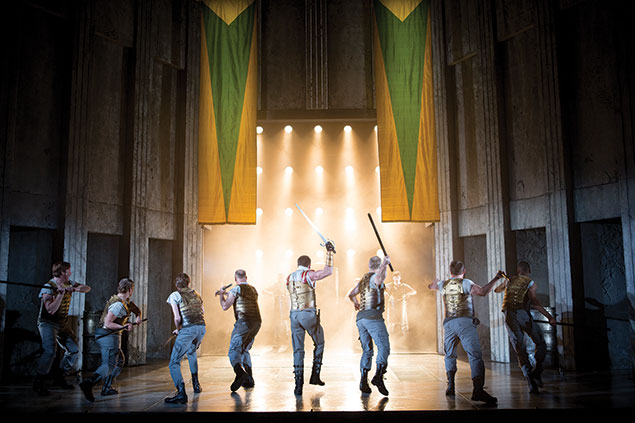
Patrick Page gives a gigantic performance in the title role of Shakespeare’s
Coriolanus at the Shakespeare Theatre Company’s Sidney Harman Hall. It is masterfully theatrical
and deliciously subtle at the same time.
Matching Page in sheer dynamism is
Diane D’Aquila as the steel-spined Volumnia, mother of Coriolanus, a patrician lady who crows with
delight upon hearing her son has been injured in battle. When the two of them interact—and
Coriolanus clearly has mommy issues—the show is electric. When one or both of them
are offstage, the play, clocking in at about three hours, has its droopy interludes.
That noted, the handsome and generally fast-moving production doesn’t feel long. Director
David Muse sees to that. He has drummers on the stage to set off battle scenes and ceremonies.
And the drumming isn’t timid—it rattles the bones (composer/sound designer
Mark Bennett). The stark concrete architecture (set design by
Blythe R.D. Quinlan) on the stage echoes at once towering Roman columns and thick German bunkers. Bunker
references aside, Muse does not set the play in some fascist country or other, a frequent
Coriolanus choice, considering the subject matter. Muse’s version ricochets through a kind of
dateless modern era, but one in which soldiers wear Roman chest armor and fight with
swords and daggers. Roman senators and tribunes, on the other hand, go about their
business in light gray suits straight from the board room, but set apart with high
collars, white dress shirts with diagonal ruffles, and for the true bigwigs, full-length
coats lined in red satin (costumes by Murell Horton). The plebeian rabble wear homespun
work clothes one step above rags.
The play has a thorny, complicated narrative full of political upheaval, chicanery,
and vengeance born of conflict between the patrician Coriolanus and the poor. Righties
and lefties through the ages have all found much ammunition in the text. Muse brings
great clarity to all these elements, setting up the factions and the stakes for maximum
understanding. When the two tribunes, Junius Brutus (Philip Goodwin) and Sicinius Velutus (Derrick Lee Weeden), who represent the plebeian masses in the senate, connive together, their lowered
voices resound with amplification, making the audience eavesdrop. The narrative shifts
time and again between rabble and aristocrats, battle and debate, all of which Muse
keeps distinct. There are a surprising number of laughs—ironic ones, mostly, and
some perhaps unintentional, born of the melodramatic intensity of it all.
Based on events from the fifth century BC at the dawn of the Roman republic, Shakespeare’s
play traces the dizzying rise and fall of Caius Martius Coriolanus, a valiant, some
might say bloodthirsty, Roman general. He returns to Rome after defeating the Volscians
and their general, Aufidius (Reginald Andre Jackson, too weak a stage presence to go up against Page) in a battle at Corioli. For this,
his fellow aristocrats bestow on Caius Martius the added honorific of Coriolanus,
then ask the plebeians and their representatives, the tribunes, to grant Coriolanus
the position of Consul. But Coriolanus despises the masses—in fact, he’s known for
it—and cannot humble himself before them as tradition demands. When his hair-trigger
temper flares, the tribunes immediately start roiling the rabble to demand death or
banishment for the hated aristocrat.
Muse makes us see with Shakespeare’s gimlet eye the mind of a warrior, the fickleness
of the body politic, the prejudice of class. Now artistic director of Studio Theatre,
Muse surely learned some of that clarity as
Michael Kahn’s associate at Shakespeare Theatre Company from 2005 to 2010. Indeed, Kahn is directing
Friedrich Schiller’s
Wallenstein, which will alternate with
Coriolanus as part of the company’s “Hero/Traitor” repertory.
Muse brings out the beauty of the language as well as the twists of plot. A play not
usually hailed for its poetry, this
Coriolanus sings from the stage, rough and tough as it is.
Coriolanus
is at Shakespeare Theatre’s Sidney Harman Hall through June 2. Running time: about
three hours, including one intermission. Tickets ($43 – $105) are available via Shakespeare
Theatre’s website.

















